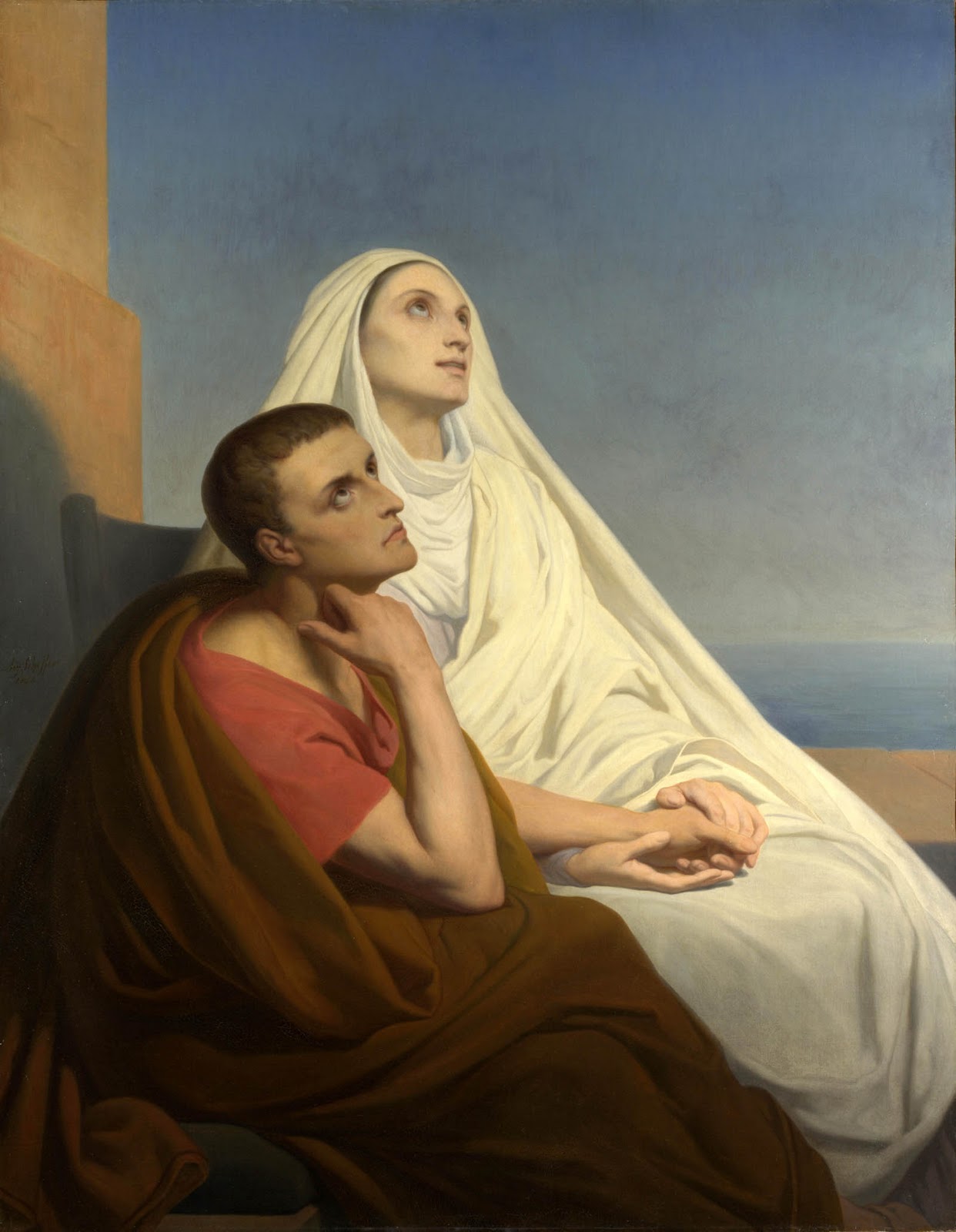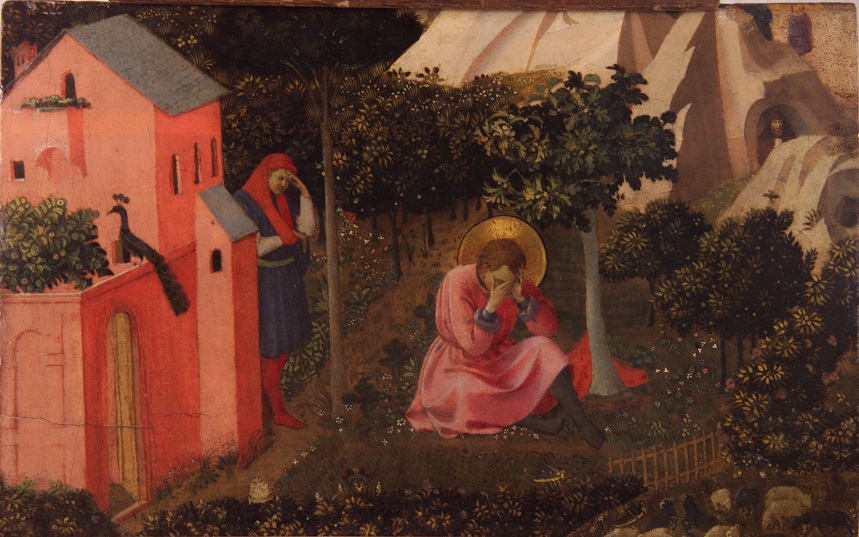Confessions of Saint Augustine .  . . • Free E-Book PDF -
. . • Free E-Book PDF -
![]()
Confessions (Latin: Confessiones) is the name of an autobiographical work, consisting of 13 books, by Saint Augustine of Hippo, written in Latin between AD 397 and 400. The work outlines Saint Augustine's sinful youth and his conversion to Christianity. Modern English translations of it are sometimes published under the title The Confessions of Saint Augustine in order to distinguish the book from other books with similar titles. Its original title was Confessions in Thirteen Books, and it was composed to be read out loud with each book being a complete unit.
Confessions is generally considered one of Augustine's most important texts. It is widely seen as the first Western autobiography ever written, and was an influential model for Christian writers throughout the Middle Ages. Professor Henry Chadwick wrote that Confessions will "always rank among the great masterpieces of western literature".
Summary
The work is not a complete autobiography, as it was written during Saint Augustine's early 40s and he lived long afterwards, producing another important work, City of God (book) . Nonetheless, it does provide an unbroken record of his development of thought and is the most complete record of any single person from the 4th and 5th centuries. It is a significant theological work, featuring spiritual meditations and insights.
In the work, Augustine writes about how much he regrets having led a sinful and immoral life. He discusses his regrets for following the Manichaean religion and believing in astrology. He writes about Nebridius's role in helping to persuade him that astrology was not only incorrect but evil, and Saint Ambrose's role in his conversion to Christianity. The first nine books are autobiographical and the last four are commentary and significantly more philosophical. He shows intense sorrow for his sexual sins and writes on the importance of sexual morality. The books were written as prayers to God, thus the title, based on the Psalms of David; and it begins with "For Thou hast made us for Thyself and our hearts are restless till they rest in Thee." The work is thought to be divisible into books which symbolize various aspects of the Trinity and trinitarian belief.
Outline (by book) [Read More Here]
= = = = = = = = = = = = =
![]()
Purpose
Confessions was not only meant to encourage conversion, but it offered guidelines for how to convert. Saint Augustine extrapolates from his own experiences to fit others' journeys. Augustine recognizes that God has always protected and guided him. This is reflected in the structure of the work. Augustine begins each book within Confessions with a prayer to God. For example, both books VIII and IX begin with "You have broken the chains that bound me; I will sacrifice in your honor." Because Augustine begins each book with a prayer, Albert C. Outler, a Professor of Theology at Southern Methodist University, argues that Confessions is a "pilgrimage of grace [...] [a] retrac[ing] [of] the crucial turnings of the way by which [Augustine] had come. And since he was sure that it was God’s grace that had been his prime mover in that way, it was a spontaneous expression of his heart that cast his self-recollection into the form of a sustained prayer to God." Not only does Confessions glorify God, but it also suggests God’s help in Augustine’s path to redemption.
= = = =
• Confessions of St. Augustine, edited by Albert Outler, Ph.D. --- Download PDF *
• Confessions, Christian Classics Ethereal Library
• Confessions of St. Augustine. Project Gutenberg editions 
Augustine and Monica -- "You have made us for yourself, O Lord, and our hearts are restless until they rest in you."
= = = = = = = = = = = = = = = = = = = = = = = = = = = = = = = = = =
• St. Augustine: Quotes (Wikiquote)
• A Short Biography of St. Augustine. 8 min. - • St. Augustine of Hippo -from Catholic Saints.net • Quotes of St. Augustine -
![]()
• St. Augustine's Conversion. 9 min.
= = = = = = = = = = = = = = = = = = = = = =
Revelations of St. Gertrude. Book 4. Chapter 51.
Chapter 51. For the Feast of St. Augustine.
As the Antiphon vulneraverunt charitas was sung at Vespers on the Feast of St. Augustine, Gertrude beheld this great Bishop standing in glory, and unfolding his heart, which had been wounded with Divine love, like a beautiful rose before God, to present it to Him, and thereby recreating the citizens of Heaven with a perfume of exceeding fragrance. The Saint then saluted him devoutly, praying for her community, and for all who were devoted to this Saint. He then besought Our Lord that the hearts of all those who desired to obtain a fervent love of God through his merits might be filled with it, as his had been, to the honor and glory of the effulgent and Ever-Blessed Trinity.
As St. Gertrude assisted at Matins with great fervor, she began to reflect what reward this great pastor of the Church had received for the delights and sweetness which he had found in contemplating the deep designs of God for the salvation of men, as he declares in his Confessions. As she reflected thus, he appeared to her in glory, bearing a globe on his head, enriched with an infinite variety of rare colors, and covered with brilliant stars, which indicated the reward that God had bestowed on him for his holy thoughts during life: such as the application of his mind to the things of God; the contempt which he had for the pleasures of life, from his desire of finding pleasure only in God; the care which he had taken to make his heart pleasing to God, who, as the Wise Man says, finds His delight in conversing with the children of men; and all the occupations to which he had devoted himself with his whole soul, either by speaking, writing or by promoting the love and glory of God by his example; and the pleasures which he enjoyed were so great and so admirable, that he could pour them forth on all.
Then Our Lord said to Gertrude: "Consider how perfect My beloved is in purity, humility and fervent charity." She replied, in great admiration: "O Lord, how can he be so pure, when he must have contracted so many stains in his wanderings from the faith before his conversion?" He replied: "I permitted these wanderings, awaiting his return with patience and mercy, and then overwhelming him with My gratuitous favors."
After these words, as she examined the ornaments of this prelate very attentively, he appeared vested in a garment of crystalline purity, beneath which she saw three colors, which indicated his purity, humility and charity; and these shone forth as gold shines through crystal. Then she said to Our Lord: "My Lord, was not St. Bernard as devoted to Three as St. Augustine, whose glory shines so resplendently? and yet it seems to me that he does not enjoy the same delights." Our Lord replied: "Bernard, My chosen one, has received an immense recompense; but your mind is not capable of discerning the glory of even the least of My Saints: how, then can it discern that of the greatest? Nevertheless, to satisfy your devotion, to increase your love, and that you may know how many mansions there are in My Father's house, understand this: when the Church sings of any Saint, Non est inventus similis illi, it means that, though all the Saints possess the glory, they do not possess it in the same degree, but each according to their merit." She replied: "O Lord God of truth, I beseech Thee, reveal to me something of the merits of the gentle Agnes and the glorious Catherine to whom I have been singularly devoted from my infancy."
After God had granted her this favor, which we have recorded elsewhere, she desired to know so etc.
• How Old Is Your Church? - • Greatest Book of All the Ages -
* Seven Missing Books of the Protestant Bible -
* History of Early Christianity -
![]()

Conversion of St. Augustine, by Fra Angelico *
* * * * * * * * * * * * * * * * * * * * * * * * *
• Account of his conversion, Book 8.
![]()
• Eternal Life, Where the Narrow Way Leads, by Stephen Foglein
• Hell, Where the Broad Way Leads
The Happiness Of Heaven:
The Joys and Rewards of Eternal Glory, by F.J. Boudreaux
Shows how the joys of Heaven stem from the direct vision of God--the joys of the heart; of the mind; of physical beauty; of the senses; of friendship; and of perfect love of God. Tells of the magnificent variety in Heaven. How Mary Magdalen's glory exceeds that of many innocent souls; etc. Explains that a high degree of glory in Heaven is within the reach of all baptized souls; however poor; ignorant or insignificant they may be here. A marvelous book!
The Rev. Fr. J. Boudreau, S.J., was a priest of the Society of Jesus and author of the nineteenth century. His work The Happiness of Heaven: The Joys and Rewards of Eternal Glory was originally published in 1872 by John Murphy & Company, Maryland. It discusses the infinite joy of the souls in Heaven, as well as the fact that all baptized persons are capable of obtaining it, no matter how seemingly insignificant they may be. Father Boudreau's book was also reset and published by TAN in 1984 with the Imprimatur.
The Happiness of Heaven. * Download TXT
Happiness of Heaven. * * All formats
Happiness of Heaven. * * html format
= = = = = = = = = = = = = = = = = = = = = = = = = = = = = = = = = = = = = = = =
. Devotion and Reflection -
 BBN -- Bible Broadcasting Network. Listen online. BBN network.
BBN -- Bible Broadcasting Network. Listen online. BBN network.
= = = = = = = = = = = = = = = = = = = = = = = = = = = = = = = = = =